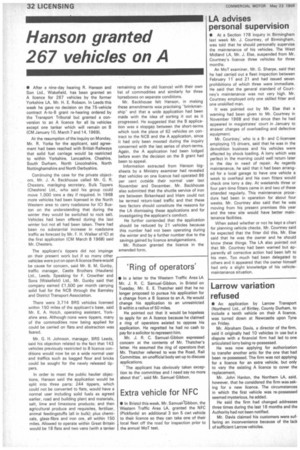Hanson granted 267 vehicles on A
Page 34

If you've noticed an error in this article please click here to report it so we can fix it.
• After a nine-day hearing R. Hanson and Son Ltd., Wakefield, has been granted an A licence for 267 vehicles by the former Yorkshire LA, Mr. H. E. Robson. In Leeds this week he gave no decision on the 75-vehicle contract A-to-B grant re-hearing ordered by the Transport Tribunal but granted a conversion to an A licence for all its vehicles except one tanker which will remain on B (CM January 10, March 7 and 14, 1969).
At the resumption of the inquiry on Monday. Mr. R. Yorke for the applicant, said agreement had been reached with British Railways that solid fuel carriage would be restricted to within Yorkshire, Lancashire, Cheshire. South Durham, North Lincolnshire, North Nottinghamshire and North Derbyshire.
Continuing the case for the private objectors, Mr. J. A. Backhouse called Mr. G. R. Chesters, man-aging secretary, Bulk Tippers (Cheshire) Ltd., who said his group could move 1,000 tons a day if required. In 1968 more vehicles had been licensed in the North Western area to carry roadstone for ICI Buxton on the understanding that during the winter they would be switched to rock salt. Vehicles had been offered during the last winter but not all had been taken. There had been no substantial increase in roadstone traffic as forecast by Mr. F. H. Walker of ICI at the first application (CM March 8 1968) said Mr. Chesters.
The applicant's tippers did not impinge on their present work but if so many other vehicles were put on open A licence there would be cause for concern, said Mr. B. M. Gunby, traffic manager, Castle Brothers (Hauliers) Ltd., Leeds. Speaking for F. Crowther and Sons (Wakefield) Ltd., Mr. Gunby said that company earned £1 .500 per month carrying solid fuel for the NCB through the Barnsley and District Transport Association.
There were 3,714 BRS vehicles licensed within 150 miles of the applicant's base, said Mr. E. A. Notch, operating assistant, Yorkshire area. Although none were tippers, many of the commodities now being applied for could be carried on flats and abstraction was feared.
Mr. G. H. Johnson, manager, BRS Leeds, said his objection related to the fact that 143 vehicles previously restricted to 13 licence conditions would now be on a wide normal user and traffics such as bagged flour and bricks could be sought for the newly released tip pers.
In order to meet the public haulier objec tions, Hanson said the application would be split into three parts: 244 tippers, which could not be converted to flats, would have a normal user including solid fuels as agreed earlier, road and building plant and materials, salt, lime and limestone products; and then agricultural produce and requisites, fertilizer, animal feedingstuffs (all in bulk); plus chemicals, glass-fibre and iron ore, all within 150 miles. Allowed to operate within Great Britain would be 18 flats and two vans (with a tanker remaining on the old licence) with their own list of commodities and similarly for three horseboxes on separate conditions.
Mr. Backhouse felt Hanson, in making these amendments was practising "brinkmanship" and that a wide application had been made with the idea of sorting it out as it progressed. He suggested that the B application was a stopgap between the short-terms which took the place of 62 vehicles on contract to the NCB and the A application, since it had only been mooted during the inquiry concerned with the last series of short-terms. Again, the A application had been lodged before even the decision on the B grant had been to appeal.
Information extracted from Hanson logsheets by a Ministry examiner had revealed that vehicles on one licence had operated 86 per cent outside their normal user last November and December. Mr. Backhouse also submitted that the shuttle service of iron ore between Birkenhead and Irlarn could not be termed return-load traffic and that these two factors should constitute the reasons for the LA dismissing these applications and for investigating the applicant's conduct.
He further contended that the application should be reduced by 21 vehicles because this number had not been operating during the winter and by a further number due to the savings gained by licence amalgamations.
Mr. Robson granted the licence in the amended form.
































































































































